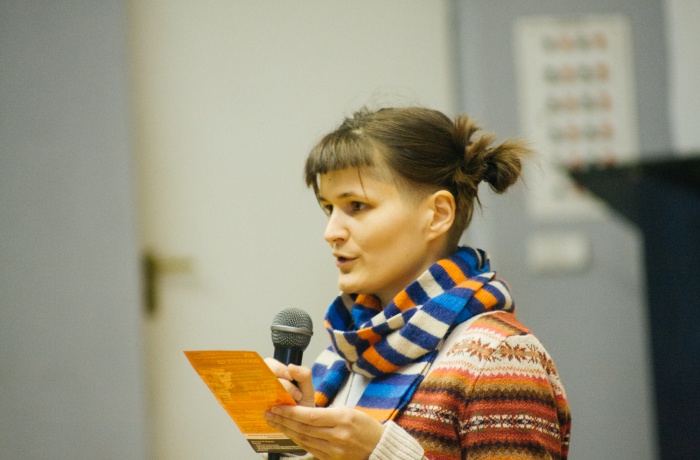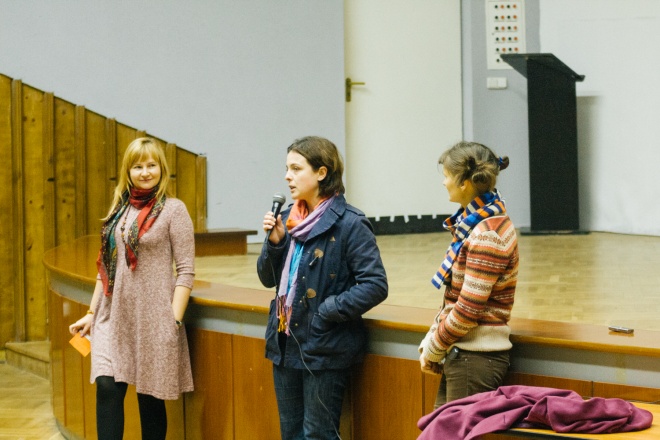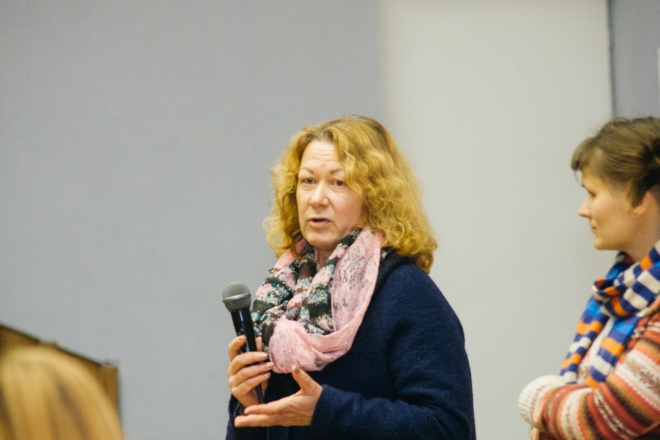"Travelling" stories at Lviv Palace of Arts
"Travelling" stories at Lviv Palace of Arts

Traveling Docudays UA’s screenings in the Lviv Palace of Arts started with “traveling” stories. On Saturday, November 4, the festival screened several films which shared the topic of labor migration: Meanwhile, The World We Live In: Wandering Workers in Germany, These Objects, Those Memories and Not My Job. Here is a review of the conversations that followed, prepared by Yosh, the discussion moderator and curator of cinema hall of the Palace.

The invited guest of the screening, a human rights advocate and journalist Olha Vesnianka talks about the film Meanwhile (directed by Yulia Appen) in the global context, where nearly all of us have “migrant” problems. “A strong symbol in this film is the girl playing on the swing in space. Now that we have the visa-free regime, we can travel more, but a friend of mine, a human rights advocate, once told me, ‘I need a hobby to ground me, to tie me to something.’ The traditional images say that we should be grounded by our families, but human beings are not trees, they can move…”
The capacity not to be tied to a place, to habitual everyday life, accompanies our ability to travel, learn and work abroad. But the films selected for screening at Docudays UA focused more on the problems of those who are forced to go abroad to work. To help us look into their world, the organizers invited a lawyer from the NGO Women’s Prospects Center, Khrystyna Kit.
The expert noted that people who move abroad face more risk and problems than regular travelers. Nevertheless, according to the findings of a sociological study in Lviv region, conducted by the Women’s Prospects Center, 50 percent of the region’s residents have worked as labor migrants at least once or are planning to do it. The same study, notes Khrystyna Kit, “asked a question: If your friends offer you a well-paid job abroad, in what conditions will you agree to work? 47 percent will agree to work unofficially, 20 percent will agree to work in a closed building without the right to leave, 11 percent will give their passports to the employer, and 6 percent will cross the border illegally.”

So why do people agree to such conditions? Khrystyna Kit’s colleague Olena Kalbus, who works with the issues of human trafficking, sees the situation of Ukrainians abroad as an extension of their situation at home, when people are often not ready to claim their labor rights and defend their dignity. “These women whom we’ve heard in the films, they are not just looking for a job, they are looking for themselves. Very often, I see that our citizens lack the feeling of personal dignity, the courage to protect their rights. And it starts here, at home, at the same jobs doing unskilled work, without labor contracts or social security.”
During the discussion of the story of ambitious Farukh from the film Not My Job (directed by Denis Shabaev), the audience tried to find something that could improve the situation in which foreign laborers finds themselves. The ideas included reaching beyond the artificial migrant “ghetto,” trying to make contacts with the locals. But, at the same time, these things are difficult to do given the prejudiced attitude of the local population and the lack of support from the government that invites you to work, uses the human resource, but doesn’t help you to adapt and protect your rights.
Not My Job demonstrates an example of how the state meets its needs for economic development using people as disposable material, how globalisation and the possibility of geographic mobility open some opportunities to us, while closing others.
On Sunday, November 5, the festival screened the films In Another World (directed by Anna Bedynska) and Dead Ears (directed by Linas Mikuta), which share the topic of living with people with disabilities. These films show the pain of parents and the difficulties they face. The discussion that followed was about the ways to support them, about the programs that help these parents in Ukraine. “What I missed in the film In Another World was support. There are organizations in Lviv that help families with disabilities. But I talked with the head of the boarding school for such children in Briukhovychi, and he said that parents there are ill with their children. Because they are left without any support whatsoever,” noted one of the viewers.

Oksana Vyniarska, the invited expert that works with issues of accompanying people with disabilities, said that Ukraine has early intervention programs aimed specifically at supporting families.
The discussion also touched the topic of the possibility of and the need for integration programs — the society has to see and accept all kinds of different people. At the same time, we must be prepared to talk to people who need “special attention,” have the necessary knowledge and skills.
Meanwhile, the problem remains open even at the stage of a pregnant woman making a decision, as shown in the film In Another World. Oksana Vyniarska comments, “I talk a lot with mothers who give birth to children with special needs. And I must tell you that nobody wants to have a child like that. But it isn’t related to love. We don’t love our children because they’re healthy, we just love them unconditionally. It is much more difficult, you need support with this. For example, a government program for early intervention.”
Photos: Dmytro Shatsky












